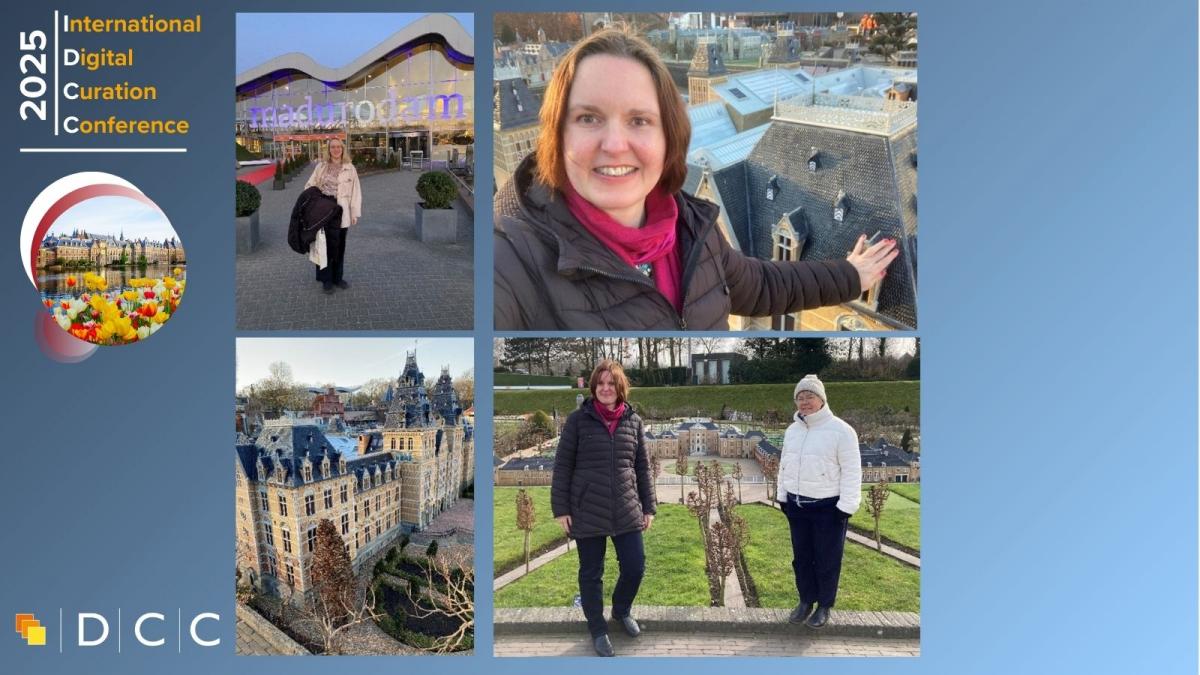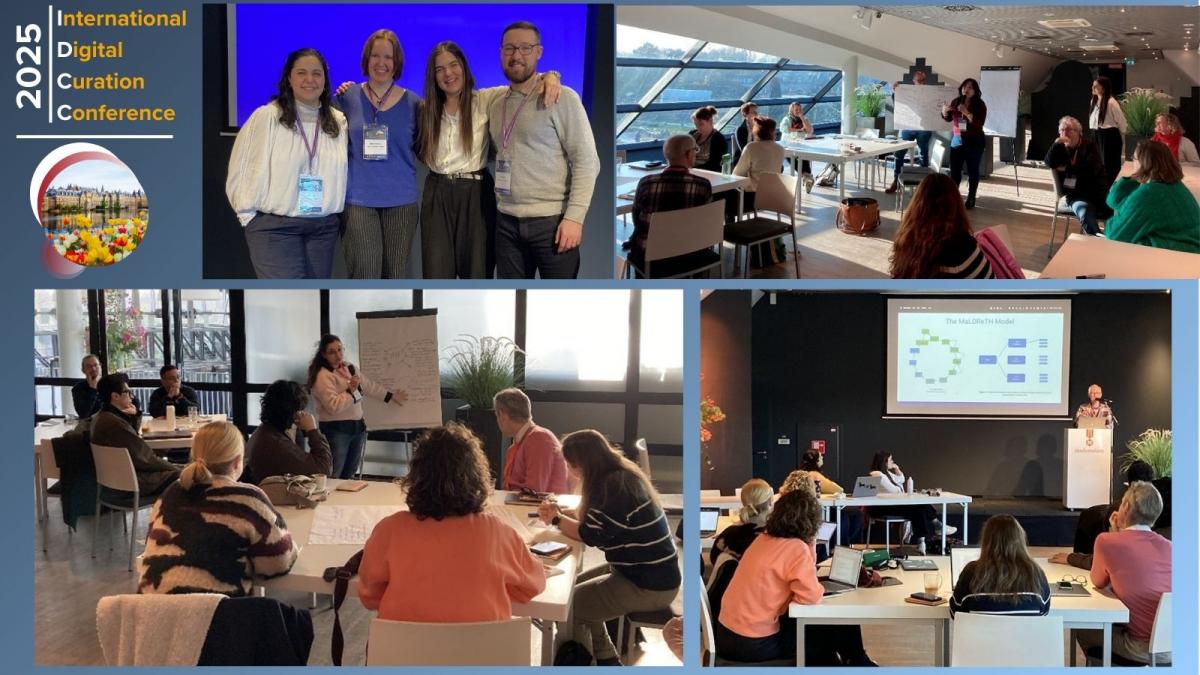You are here
Community, inspiration, and the importance of looking back to see forward: My reflections on IDCC25 in The Hague
Community, inspiration, and the importance of looking back to see forward: My reflections on IDCC25 in The Hague
Agnes Jasinska, Research Data Specialist
Mid-February is always an exceptionally busy and exciting time at the Digital Curation Centre - we host the International Digital Curation Conference (IDCC) and welcome guests from all over the world to come share their knowledge, ideas, and enthusiasm for digital curation, research data management, and Open Science. And this year was no different.
The IDCC25 took place on 17-19 February in The Hague (or Den Haag), the administrative capital of The Netherlands. But if you are picturing a dull conference centre, think again. It is the creative genius of our events specialist, Linda Freimane, to pick a location that would surprise and delight: Madurodam! A charming theme park where you can stroll through miniatures of the most famous Dutch cities and landmarks while sipping chocolademelk and catching up with dear colleagues you only ever see on zoom.

The first day of the IDCC is a workshop day. This year, I assisted with two excellent workshops: the Physical Sciences Data Infrastructure (PSDI) workshop in the morning and the DMPonline workshop in the afternoon.
Workshops are a wonderfully flexible format. They can include short or longer presentations, hands-on demos, small-group activities, and whole-group discussions – all meant to actively engage the participants. The PSDI workshop - titled “Creating communities around best practices and common challenges in data: The role of data stewards” - started off with short presentations by the PSDI team, followed by small-group discussions documented in shared notes.

The first day of the IDCC is a workshop day. This year, I assisted with two excellent workshops: the Physical Sciences Data Infrastructure (PSDI) workshop in the morning and the DMPonline workshop in the afternoon.
Workshops are a wonderfully flexible format. They can include short or longer presentations, hands-on demos, small-group activities, and whole-group discussions – all meant to actively engage the participants. The PSDI workshop - titled “Creating communities around best practices and common challenges in data: The role of data stewards” - started off with short presentations by the PSDI team, followed by small-group discussions documented in shared notes.
The DMPonline workshop – titled “Future-Proofing Data Management: Interactive Workshop on DMPonline's Progress and Path Forward” - used a similar structure but included a longer talk by a guest speaker – Rory Macneil from RSpace – before engaging the participants in a hands-on activity to diagram the optimal information flow into and out of data management plans.
I greatly enjoyed both workshops – and I believe the participants did as well. A range of roles and countries were represented, bringing multiple perspectives and expertise types to the discussion. I also saw participants exchange contact information and make plans to continue the conversation after the workshop – always a good sign.
On day 2, Kevin Ashley, the DCC Director, kicked off the main portion of IDCC25 with his welcome address, followed by the keynote speaker Marta Teperek from Open Science NL.
The theme of IDCC25 was “Twenty years back, twenty years forward: Lessons and directions in digital curation” – and we could not have asked for a more moving and inspiring opening speech than that delivered by Marta. Even her approach to preparing the speech perfectly captured the spirit of community and collaboration that IDCC strives to embody. Rather than sharing only her own experiences or opinions, Marta reached out to other women leaders in the field and asked them for help in reflecting on the main challenges and accomplishments of the last two decades as well as those anticipated in the future. The resulting presentation shone like a diamond with a multitude of insights from a variety of perspectives, all painting a compelling story of our field making a steady and committed progress toward the goals of FAIR and Open Science.
I was so inspired by her keynote speech that I sought out Marta afterward to thank her, and we had a lovely conversation. We are both from Poland. I hope we will stay in touch and collaborate on some projects in the future. Meeting new colleagues and making new friends is the highlight of every conference for me!
As the organizers, the DCC team is never idle during the conference. While Linda, Alejandra, and Al take care of the registration and event logistics, the rest of us – Kevin, Joy, Laurence, Clara, Marta, Andrea, and myself – support the conference in whatever way is needed, from hosting a poster session to monitoring the questions from online participants. And I can honestly say that all the sessions I attended this year were terrific and ran smooth as clockwork.

A few talks that stood out as particularly interesting and relevant: Nida van Leersum and Saba Sharma reporting on the Skills4EOSC training for data stewards; Joao Aguiar Castro sharing his approach to teaching doctoral students about good data management; Willeke de Haan describing how her institution both supports data management plans and utilizes them to improve data services; Dieuwertje Bloemen demonstrating the importance of integrations between research tools; Pen-Yuan Hsing sharing survey results on realizing open data principles in UK institutions; and Liise Lehtsalu presenting on RDA TIGER and the importance of soft infrastructure in shaping community-driven RDM standards.
Given the past-and-future theme of this year’s IDCC, I also particularly enjoyed the talks that shed light on the often surprisingly colourful and human history of our field. Two talks come to mind: Ruth Mallalieu and Robin Rice recounting (with plenty of dry humour) the evolution of institutional data services in the UK; and Ingrid Dillo (a historian by training!) reflecting on the past, present, and future of DANS. Apparently the FAIR data principles (FAIR for findable, accessible, interoperable, and reusable) were first conceived in a pub over pints of beer?? How cool is that? And what next great idea will spring into existence or gain definition while a group of data curation professionals share a meal or drinks (not necessarily alcoholic; chocolademelk is just fine)?
If I could share only one insight from IDCC25 it would be this: We have to look back at our history if we hope to see forward to our future. How else could we understand how a simple acronym such as FAIR could transform the field of data curation seemingly overnight – and apply this knowledge to engineer similar breakthroughs when we need them?
What will the next five, ten, and twenty years bring? In a way, it is up to us. So maybe a better question is: What do we want the future of data curation and Open Science to look like?
Keep brainstorming – and see you at IDCC26!

